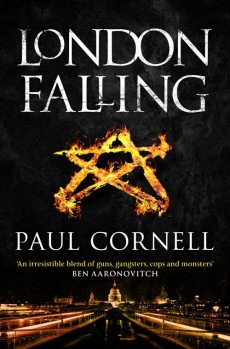I’d heard many good things about London Falling, and had always liked Paul Cornell’s work on Doctor Who, so it was with some degree of anticipation that I added this book to my reading list.
I’ll ‘fess up – as I write this review it’s been at least a month since I finished it (and I’ve devoured three Neil Gaiman books since then). Consequently, my memories of London Falling aren’t quite as fresh as they probably should be for writing a review.
But, sod it.
I had a few things I wanted to say about London Falling. Firstly it’s a pretty good book. it’s a grim book, no doubt about it, but it’s also a vibrant, compelling mystery. I’d like to say that it’s essential reading for anyone who’s lived in London for any length of time (and it probably is) but I can’t, hand on heart, say that because I lived in London for 35 years and I can’t admit to connecting with the London that Cornell depicts in London Falling. This isn’t necessarily a problem: the London that Cornell writes about is a dark and hidden place, out of sight for most of its inhabitants. It’s a London that exists only for those few who are able to see it.
Whether it was intentional or not, I found this disconnect (with people not always seeing what’s secretly happening around them) reflected in Cornell’s writing style. In my review of Brilliance by Marcus Sakey I write about ‘muddiness’ in writing: an effect whereby the reader (i.e. me) can’t quite visualise what it is that the writer is trying to describe. It took me quite some pages to fully get stuck into London Falling (luckily there was enough mystery and character conflict to keep me intrigued) but even when the plot settled itself in my head I was still never quite confident I was in the right place, and I kept noticing odd non sequiturs in the prose. There were moments where characters said things that didn’t align with their actions, or vice versa, and there were numerous occasions where I had to reread paragraphs because I felt I’d missed something.
(FYI I just skimmed through the book to find an example of the above, but of course I failed! Should’ve highlighted one while I was reading the book.)
Anyway, this may just be me being an inattentive reader, but it did make London Falling slightly harder work than expected. Luckily the payoff is worth it and there are at least one or two big twists that Cornell deftly hides and then throws at the reader.
What did I learn?
One of the things I put a lot of work into in my own writing is something I think of as ‘transitions’. It’s a less wanky way of saying that the writing should flow organically: if you want a character to walk from one room to the next, or for a conversation to start on one topic and end up somewhere else, then there needs to be a transition, and it’s got to feel natural. If a character starts drinking a cup of tea, then it needs to be because we know that character is thirsty, or someone’s just made them a cuppa, or they’re deferring giving someone a response. It can be for any reason, but that cup of tea is a tiny stepping stone in your scene, it helps to take the reader from one point to the next and also helps the reader to stay on the path you’re crafting for them (ideally without them remembering they’re on a path). If the cup of tea introduces a step away from the path then the reader has to stop, work out where they are, then find the path again before they can carry on.
Now, I’m not saying Cornell has failed in the above. I’m far more inclined to believe it’s failing of myself as a reader; after all he’s been writing a lot longer than I have, and I’ve only recently gotten back into reading. Nevertheless, my personal experience of reading London Falling helped to crystallize my thoughts about how to guide readers silently, invisibly through your story.
And, anyway, whatever struggles I experience with London Falling, I’m still dead keen to read the sequel!
